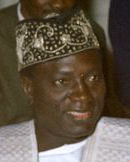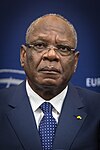Mali is located in Africa. The history of the territory of modern Mali may be divided into:

Alpha Oumar Konaré is a former President of Mali for two five-year terms, and was Chairperson of the African Union Commission from 2003 to 2008.

Modibo Keïta was the first President of Mali (1960–1968) and the Prime Minister of the Mali Federation. He espoused a form of African socialism.

Moussa Traoré is a Malian soldier and politician who was President of Mali from 1968 to 1991. As a Lieutenant, he led the military ousting of President Modibo Keïta in 1968. Thereafter he served as head of state until March 1991, when he was overthrown by popular protests and a military coup. He was twice condemned to death in the 1990s, but eventually pardoned on both occasions and freed in 2002. He has since retired from political life.
The Rally for Mali is a Malian political party created by Ibrahim Boubacar Keïta in June 2001. In 2013, Keita was elected President of Mali following several attempts, and the party took first place in parliamentary elections, winning 66 seats, although not enough for a majority.

Cheick Modibo Diarra is a Malian astrophysicist, businessman, and politician who was acting Prime Minister of Mali from April 2012 to December 2012.

The Alliance for Democracy in Mali – Pan-African Party for Liberty, Solidarity and Justice is a political party in Mali.
African Solidarity for Democracy and Independence is a left-wing political party in Mali. It was founded by Cheick Oumar Sissoko and Oumar Mariko in 1996; Sissoko is the party's President and Mariko is its Secretary-General, the top post in the party. The party is Pan-Africanist in ideology, is affiliated internationally with the International Communist Seminar, a grouping organised by the Workers Party of Belgium, and is in part an outgrowth of the 1991 demonstrations against the military rule of President Moussa Traoré. Mariko was head of the Association of Students and Pupils of Mali (AEEM) during the 1991 protest movement which overthrew the government.

Articles related to Mali include:

Presidential elections were held in Mali on 29 April 2007. Incumbent president Amadou Toumani Touré ran for re-election against seven other candidates and won in the first round with about 71% of the vote.
Oumar Mariko is a Malian politician, doctor and noted former student activist. He is the Secretary-General of African Solidarity for Democracy and Independence (SADI), a left-wing political party, and has three times run for President of Mali, in 2002, 2007 and 2013.

Amadou Haya Sanogo is a Malian military officer who was leader of the 2012 Malian coup d'état against President Amadou Toumani Touré. He proclaimed himself the leader of the National Committee for Recovering Democracy and Restoring the State (CNRDRE). Sanogo was also said to be involved in the arrest and resignation of acting Prime Minister Cheick Modibo Diarra in December 2012, leading to the appointment of civil servant Django Sissoko as Prime Minister. According to Human Rights Watch, Sanogo’s forces were implicated in serious human rights abuses including torture, sexual abuse, and intimidation against journalists and family members of detained soldiers.
Dramane Dembélé is a Malian politician who served in the government of Mali as Minister of Urban Planning and Housing from 2015 to 2016. A mining engineer by profession, he was Director-General of Geology and Mines from 2005 to 2010. He was the candidate of the Alliance for Democracy in Mali (Adéma-PASJ) for the July 2013 presidential election.
Cheick Bougadary Traoré is president of the African Convergence for Renewal (CARE), was selected as a candidate of his party on 28 January 2012 for the 2013 Malian presidential election. Traore is the son of President Moussa Traoré.
Mamadou Djigué was a candidate for the 2013 Malian presidential election under the banner of the Youth Movement for Change and Development (MJCD). He announced his candidacy at a meeting held at the International Conference Centre of Bamako, the capital of Mali, in the presence of his father Ibrahima N'Diaye, senior vice president of the Alliance for Democracy in Mali-African Party for Solidarity and Justice.

Presidential elections were held in Mali on 29 July 2018. In July 2018, the Constitutional Court approved the nomination of a total of 24 candidates in the election. As no candidate received more than 50% of the vote in the first round, a runoff was held on 12 August 2018 between the top two candidates, incumbent President Ibrahim Boubacar Keïta of the Rally for Mali and Soumaïla Cissé of the Union for the Republic and Democracy. Keïta was subsequently re-elected with 67% of the vote. It was the first time in Malian history that a presidential election was forced into a runoff between incumbent and a challenger.























